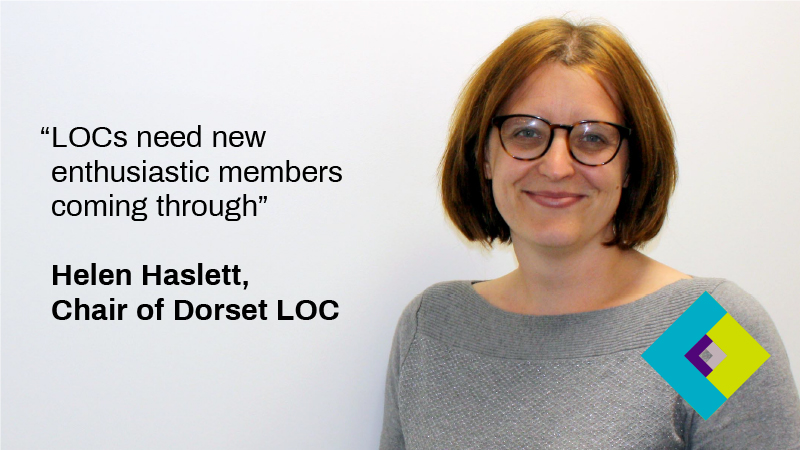Engaging the next generation – LOCs rise to the challenge
28 October 2019
The challenge of engaging and inspiring a new generation of optometrists to become active in LOCs is a common theme identified during the LOCSU needs analysis exercise. Two LOCs in different parts of the country have been exploring how to build connections with early career optometrists…

In Dorset, LOC Chair Helen Haslett and her committee are keenly aware of the need to reach younger members of the profession, as she explains: “Any activity that helps to drive down the age demographic is a good one and every age group has a lot of new perspectives to offer; LOCs need new enthusiastic members coming through. Younger opticians’ experience of training is very different to those that qualified even a decade before, so it’s important that we can access those ideas.”
Dorset LOC has found CET events to be a positive way of engaging with potential new recruits: “Last year we did an event on low vision and that was successful with a good range of people attending,” says Helen. “The challenge is getting the next generation aware of what we do and why it’s important.”
Choosing communications channels
Finding the right channel through which to do this is something the Dorset LOC has been investigating. “I’ve been looking into running Facebook Live Q&A sessions following LOC meetings to give a wider audience an easy opportunity to see what goes on at meetings,” explains Helen, noting that different age groups prefer different channels. “Facebook reaches a particular age demographic – thirties through to fifties – but it isn’t so popular with younger audiences. We’re trying to make more use of Twitter, but it can be difficult to make our subject relevant. YouTube is another option that has wider appeal so we’re considering whether that could also be worthwhile.”
Suffolk LOC identified a similar challenge, as LOC Chair David Hill explains: “We are conscious of the changing demographic of the optical sector and we identified a real need to engage with students who are just coming into their pre-reg year. We also recognised that time passes very quickly and you can soon find that you’ve been on the LOC for a decade, so we’ve decided to make it easier for committee members to join and leave the LOC by adopting LOCSU recommendations on electing by thirds, so every year some join the committee and some leave.”
Suffolk faces particular challenges due to its rural geography, as David explains: “We have a problem sustaining the population of optometrists in the region. Many come for pre-reg placements but, once qualified, head back to their home town. We realised that these early career optometrists can often feel isolated and there’s a lack of opportunity to meet up with peers and make connections that might persuade them to put down roots in the region.”
Mixing socialising with learning opportunities
Suffolk LOC seized the initiative by co-opting recently qualified optometrist Sareena Parmar onto the committee. She had some advice on the type of event the LOC should offer to attract the pre-reg community: “We suggested a meet-up dinner,” says David, “but Sareena felt this might be rather intimidating. She suggested that a more structured event, with an element of information-sharing, would attract more participants. We decided to offer a session looking at local referral protocols and explaining what pre-reg students can expect during their assessment visits, followed by an informal meal.”
Sareena explains some of the challenges that pre-reg students face: “With all the demands of studying and working, pre-reg students can be very time-poor, so to encourage them to commit their time to come along to an event we need to offer some learning incentives. Then the opportunity to network with peers happens as a useful side-effect.”
Sareena remembers feeling isolated as a pre-reg student: “I’d moved from Leicester to my first role in a new, rural area and I was working hard and studying, so it was quite intense. There wasn’t really any way to find other pre-reg students in the area to speak to, so I found it quite isolating.” She became aware of the LOC through her practice, who invited her to come along: “I didn’t really know anything about the LOC and what it did before that,” she says, “it was only the personal invitation that got me involved, so if that isn’t there, it’s hard to see how new members would find out about LOCs. There is definitely a need to find new ways to get in touch with pre-reg students.”
The committee in Suffolk now has two events planned and is anticipating that 6-8 students will attend each.
Data protection dilemma
Both Dorset and Suffolk LOCs have struggled with finding a mechanism to contact pre-reg and early career optometrists, as Helen explains: “GDPR restrictions mean that universities and the College of Optometrists are unable to share details of students, which makes it incredibly hard to establish a dialogue with those we’re trying to reach. There would be enormous advantages to the students, the LOC and the sector overall if we were able to make that connection early in their careers. The difficulties in identifying this group is a significant problem that we need to resolve.”
Despite the challenges, both Dorset and Suffolk LOCs are committed to continuing their drive to get the next generation actively involved through new channels and initiatives.

